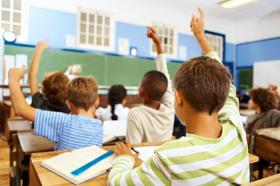For the 2025-26 school year, there is 1 public school serving 40 students in Central Lakes Adventure School District. This district's average testing ranking is 5/10, which is in the bottom 50% of public schools in Minnesota.
║┌┴¤═°╣┘═° School in Central Lakes Adventure School District have an average math proficiency score of 50% (versus the Minnesota public school average of 46%), and reading proficiency score of 20% (versus the 51% statewide average).
Minority enrollment is 20% of the student body (majority Hispanic), which is less than the Minnesota public school average of 39% (majority Black and Hispanic).
Overview
This School District
This State (MN)
# Schools
1 School
2,724 Schools
# Students
40 Students
870,541 Students
# Teachers
3 Teachers
57,765 Teachers
Student-Teacher Ratio
13:1
13:1
Student By Grade
District Rank
Central Lakes Adventure School District, which is ranked within the bottom 50% of all 520 school districts in Minnesota (based off of combined math and reading proficiency testing data) for the 2021-2022 school year.
The school district's graduation rate of 50% has increased from 21-39% over five school years.
Overall District Rank
#508 out of 525 school districts
(Bottom 50%)
(Bottom 50%)
Math Test Scores (% Proficient)
(21-22)<50%
45%
Reading/Language Arts Test Scores (% Proficient)
≤20%
51%
Science Test Scores (% Proficient)
≤20%
41%
Graduation Rate
(21-22)<50%
84%
Students by Ethnicity:
Diversity Score
0.35
0.59
% American Indian
3%
2%
% Asian
2%
7%
% Hispanic
10%
12%
% Black
n/a
12%
% White
80%
61%
% Hawaiian
n/a
n/a
% Two or more races
5%
6%
All Ethnic Groups
District Revenue and Spending
Total Revenue
$680,000
$15,547 MM
Spending
$656,000
$16,179 MM
Revenue / Student (13-14)
$14,137
$12,820
Spending / Student (13-14)
$13,451
$13,172
Best Central Lakes Adventure School District ║┌┴¤═°╣┘═° Schools (2025-26)
School
(Math and Reading Proficiency)
(Math and Reading Proficiency)
Location
Quick Facts
Rank: #11.
Central Lakes Adventure School
Charter School
(Math: <50% | Reading: ≤20%)
Rank:
Rank:
4/
Bottom 50%10
12763 County Rd 1
Pillager, MN 56473
(218) 746-3875
Pillager, MN 56473
(218) 746-3875
Gr: 7-12 | 40 students Student-teacher ratio: 13:1 Minority enrollment: 20%
Frequently Asked Questions
How many schools belong to Central Lakes Adventure School District?
Central Lakes Adventure School District manages 1 public schools serving 40 students.
What is the rank of Central Lakes Adventure School District?
Central Lakes Adventure School District is ranked #307 out of 520 school districts in Minnesota (bottom 50%) based off of combined math and reading proficiency testing data for the 2021-2022 school year.
What is the racial composition of students in Central Lakes Adventure School District?
80% of Central Lakes Adventure School District students are White, 10% of students are Hispanic, 5% of students are Two or more races, 3% of students are American Indian, and 2% of students are Asian.
What is the student/teacher ratio of Central Lakes Adventure School District?
Central Lakes Adventure School District has a student/teacher ratio of 13:1, which is lower than the Minnesota state average of 15:1.
Recent Articles

Gifted & Talented Programs in ║┌┴¤═°╣┘═° Schools
Explore opportunities and controversies in gifted & talented programsÔÇöequity, outcomes, and models shaping public education in 2025.

Evaluating STEM in ║┌┴¤═°╣┘═° Schools: A Parent & District Guide
A guide to evaluating STEM programs in public school districtsÔÇömetrics, best practices, equity, and 2025 trends for parents and community stakeholders.

Special Education in ║┌┴¤═°╣┘═° Schools: Understanding IEPs & Services
What parents need to know about IEPs, services, rights, and how to get the best support in public schools in 2025.





